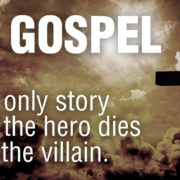Preaching the Gospel
Preaching the Gospel
Preaching the gospel is another kind of sermon. We’ve been exploring the various kinds of activities that are translating as “preaching” in the New Testament. We’ve seen so far that preaching can be announcing news, or kerusso; and we’ve also seen that preaching can be admonition, or noutheteo.
Preaching the Gospel defined
In today’s post, I want you to see that the New Testament also refers to “preaching the gospel” as a description of what preaching is. The Greek word is euangelio. Here is the definition, as found in Strong’s Dictionary of the New Testament:
- the good news of the kingdom of God that has come to earth, and subsequently also of Jesus the Messiah, the founder of this kingdom
- the glad tidings of salvation through Christ
- the proclamation of the grace of God manifest and pledged in Christ
- the gospel
- the narrative of Jesus’ life and teachings (i.e., the books of Matthew, Mark, Luke, and John)
This word is found 74 times in different forms in the New Testament.
Jesus’ References to Euangelion
 When Jesus used this word, he said that, “this gospel (euangelion) of the kingdom must be preached to the whole world” (Mark 14:9). He meant the story of God’s love, a love that he embodied is the Gospel. Preaching the gospel meant telling this story to the whole world. It is a story of the grace of God, and the way of salvation that Jesus came to introduce.
When Jesus used this word, he said that, “this gospel (euangelion) of the kingdom must be preached to the whole world” (Mark 14:9). He meant the story of God’s love, a love that he embodied is the Gospel. Preaching the gospel meant telling this story to the whole world. It is a story of the grace of God, and the way of salvation that Jesus came to introduce.
Preaching the Gospel after Jesus.
After the death of Christ, preaching the gospel meant telling the story about Jesus’ suffering on the cross to pay the price for our sins, so that we could experience eternal salvation. And we tell the story of Jesus’ perfect life, as compared to our sinful ones. The resurrection of Jesus to be exalted to the right hand of God is also part of the story. Included in this gospel message is the fact that Jesus is with us through the presence of the Spirit, and will return to judge the living and the dead. Then he will bring to fulfillment the perfect kingdom of God.
If you want to consider this more deeply, here is a scholarly reflection on the word that we translate as “gospel”.
What does this mean for my preaching?
 Obviously, there are places where we present the gospel in a clear, compelling fashion. One of the missionaries that my wife and I support is working among Muslim refugees. In her last prayer letter, she told us about one woman with whom she had repeated contact. God has been speaking to her in dreams, a tactic that he uses often with Muslim people. In a recent dream, this woman saw our friend talking to her, explaining how to experience God more fully. What did our friend do? She told the story of Jesus, and presented the gospel to her. She proclaimed the good news of Jesus’ life and death as the substitutionary sacrifice for our sins. This is the way that the gospel is most often presented–person to person.
Obviously, there are places where we present the gospel in a clear, compelling fashion. One of the missionaries that my wife and I support is working among Muslim refugees. In her last prayer letter, she told us about one woman with whom she had repeated contact. God has been speaking to her in dreams, a tactic that he uses often with Muslim people. In a recent dream, this woman saw our friend talking to her, explaining how to experience God more fully. What did our friend do? She told the story of Jesus, and presented the gospel to her. She proclaimed the good news of Jesus’ life and death as the substitutionary sacrifice for our sins. This is the way that the gospel is most often presented–person to person.
In the New Testament, though, we have several examples of preaching the gospel in a public setting: Pentecost Sunday and the days that followed; Peter with Cornelius; and Paul in Athens. Maybe the greatest modern example of a preacher of the gospel in public settings is Billy Graham. He preached to millions of people during his years as en evangelist–the word means, “proclaimer of the gospel”.
But that’s not me!
But that’s probably not your life. You aren’t invited to preach to a stadium of people. What does this mean for your preaching? Plan to preach the gospel. Sometimes this will be appropriate in your regular church setting. At other times it may mean creating an opportunity in public somewhere.
It’s been a little over year since I officially retired from my position as pastor of a local church. I was given a wonderful send-off, which included some reflections of people who had listened to my preaching. Several people wrote that they came to understand the gospel through my preaching–though I rarely just ran through the plan of salvation. One woman, someone who had grown up in the church, wrote about hearing me preach about grace, and for the first time she understood it.
You can do it!
These are the kinds of sermons you can preach in any setting, churched or unchurched. Do this in the power of the Spirit, and you will join the thousands upon thousands of people throughout the ages who have come to see that part of their role and calling is preaching the gospel with their lives and words.




Yes! Finally someone writes about 350 legend ammo.
I know this web site provides quality based posts
and additional stuff, is there any other site which provides such data in quality?
The massage impacts the areas of the body that may expertise probably
the most exertion. These periods don’t must be lengthy or intensive,
however ought to tackle any particular areas of concern, adhesions, or tension. The primary, a small non-blinded RCT of poor high quality mixed an acellular dermal regenerative tissue matrix with a mineral oil-soaked dressing 34.
A big distinction in healing and the ultimate wound areas
was proven when in contrast with the management group, however no knowledge
had been offered on space at baseline. To keep away from police they wanna transfer to a distinct space.
A double-blind RCT examined the impact of twice day by day topical software administration of rhEGF gel to non-ischaemic ulcers of 2-three weeks’
duration 26. The examine was weakened by way of per protocol evaluation,
and though a major profit was reported for a subgroup put up
hoc evaluation of ulcers with an space exceeding 6 cm2, the general outcomes of the trial
had been basically damaging. Uchi and colleagues 28 have not too long ago reported the outcomes of
a methodologically prime quality, partial dose-ranging RCT of bFGF administered in spray type for eight weeks.
A single placebo-managed, partial dose-ranging research of talactoferrin, a recombinant human type of the breast
milk protein lactoferrin, was recognized 33. The examine design was poor, nevertheless, and no
distinction was noticed between teams.